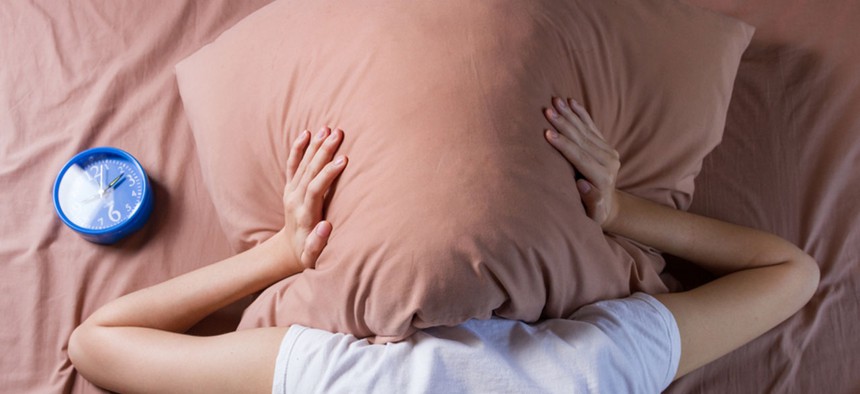
Kashin/Shutterstock.com
There’s an App to Treat Insomnia That Seems to Actually Work
A gentle, soothing voice will tell you just what you need to improve your sleep.
As you go to bed, imagine being told in a gentle, soothing Scottish accent just what you need to do to improve your sleep. It’s nice even for those, like me, who don’t have sleep problems. That’s the promise of Sleepio, an app that provides personalized therapy to fix your sleep problems.
More than one in 10 people suffers from some form of insomnia. So any insomnia therapy that is easy to access, relatively cheap, and actually works has huge potential.
Peter Hames, the co-founder of Big Health, the company behind Sleepio, says the evidence that it works comes in the form of three small but rigorous studies. As further evidence, he says that more than 500,000 employees worldwide have access to Sleepio as a benefit paid for by their employers.
Meet the Prof
Sleepio’s smartphone app uses a character called “the Prof,” who analyzes your data—such as age, profession, sleep patterns, and sleep problems—and then tailors his advice accordingly. The audio snippets seem pre-recorded, but they appear in varying order based on the data that you feed into the app.
For example, I pretended to have some sleep problems when answering Sleepio’s questionnaire. In response, the Prof said, “Your sleep score is above average for your age. You seem to sleep all through the night, but don’t feel refreshed when you wake up. Around 9% of people have the same kind of problem as you.”
I said that I had problems falling asleep because of noise. If I can’t eliminate the noise, the Prof said, I should try “desensitization.” This involves recording the noise that bothers me at night, and then listening to it through headphones during the day, while staying relaxed. The more I do this, the Prof said, the more my mind will get accustomed to the noise, and the easier it will be to fall asleep in spite of it.
Sleepio was created after Hames used the work of Oxford University professor Colin Espie to, he says, fix his own sleep problems. Espie’s work uses cognitive behavioral therapy (CBT), a form of talk therapy that works by tweaking a patient’s poor habits and harmful patterns. Different forms of CBT have been used to treat problems ranging from eating disorders to schizophrenia.
The Prof at work
The most recent piece of evidence that Sleepio works comes from a study published in the Journal of Occupational and Environmental Medicine. It was done with a relatively small sample size, and the lead researcher was a co-founder of Big Health, but nonetheless, the journal is peer-reviewed, and the methodology seems rigorous. The study involved some 270 employees of a Fortune 500 company (which one, Hames won’t tell), who said they suffered from insomnia.
The study found that participants who used Sleepio reported a 10% increase in sleep efficiency, which means they spent 10% more time asleep of the total time they spent in bed. They also reported feeling more productive and taking fewer sick leaves.

CBT has been shown to help with sleep before. A 2015 survey of 20 other studies found that CBT delivered via real-life therapists helped insomnia sufferers fall asleep 20 minutes sooner, on average and spend 30 fewer minutes awake during the night. The results lasted at least for six months.
There may of course be a difference between CBT delivered by a person and by a computer. Yet, if Sleepio can jump that divide, it’ll do the world a service. Even the UK’s National Health Service, known to be a difficult customer for anyone selling new-age therapies, has an ongoing trial with Sleepio. A Fortune 500 company may have a lower bar, but if Sleepio saved even a single sick day, that would probably justify its $300 per person annual fee.






